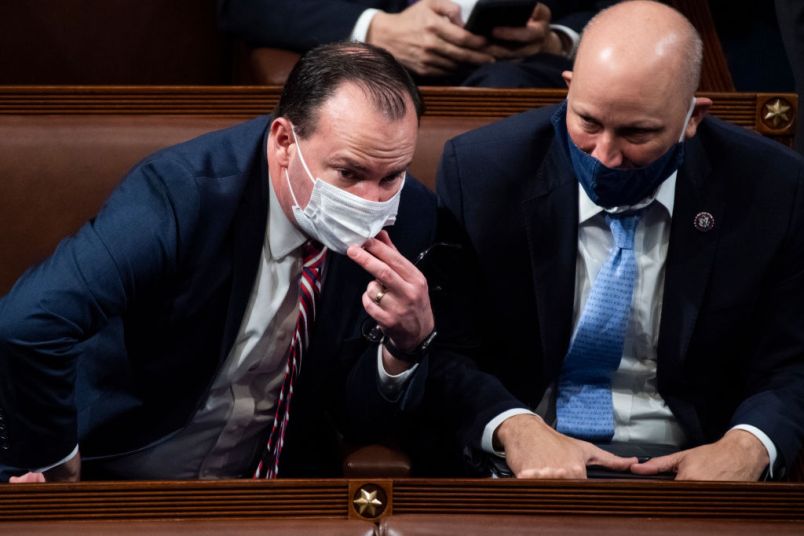It was days after the 2020 election, and Sen. Mike Lee (R-UT) knew who could help Republicans hold the White House.
Sidney Powell — the Trump attorney and who would go on to suggest that the late Hugo Chavez had masterminded a conspiracy to cyber-flip the election to Biden.
Describing her as a “straight shooter,” Lee wrote to Trump Chief of Staff Mark Meadows on Nov. 7: “Apparently she has a strategy to keep things alive and put several states back in play. Can you help get her in?”’
Powell did “get in,” according to messages that Lee sent to Meadows that were given to the January 6 Committee and obtained by CNN.
Lee’s lobbying for Powell is all the starker after his Monday debate with independent Evan McMullin, who he’s running against to retain his Senate seat in Utah this cycle.
Lee, though still the favorite to win, only leads McMullin by four points according to a recent poll. During the debate, McMullin, a former CIA officer and never-Trump celebrity, took Lee to task for his involvement in the lead-up to January 6.
McMullin’s critique went beyond Powell, however, and to the heart of what Lee did for Trump in 2020 and continues to do: suggest that fake electoral votes can change the outcome of an election.
Trump tried to use the strategy in 2020. Acting on the advice of a team of attorneys that included John Eastman and Ken Chesebro, the Trump campaign arranged for groups of GOP activists and officials in states that Biden won to sign documents proclaiming that they, and not Biden’s electors, were representatives of the state.
It was a strange plan — one that differed in its details depending on who was advancing it and the number of avenues to subvert the results that Trump had exhausted. At various times, Trump’s associates argued that it would give either federal courts, state legislatures, state officials, Congress, or Mike Pence the opportunity to reject the Biden electoral votes and replace them with the Trump ones.
That would require, in most interpretations, the states re-certifying the election: dropping the Biden electors which represented the legitimate outcome, and replacing them with the fake Trump certificates.
Lee denied on Monday that he “supported or ever did support a fake electors plot,” accusing McMullin of showing a “cavalier, reckless disregard for the truth.”
He added that he was merely investigating “rumors” which had it that “some states were considering switching out their slates of electors.”
“I did research on that, I made phone calls to figure out whether the rumors were true,” Lee added, saying that he concluded they were untrue.
But text messages show that throughout the transition period, Lee was texting with some of the key figures in the fake electors plot, taking on the role not of an investigator, but of an actor, seeking to ensure that the plot took a form that he and other GOP legislators could move forward.
“If you want senators to object, we need to hear from you on that ideally getting some guidance on what arguments to raise,” Lee texted Meadows on December 16. “I think we’re now passed the point where we can expect anyone will do it without some direction and a strong evidentiary argument.”
As January 6 approached, Lee wrote to Meadows that he needed to ensure the states would submit “new slates of electors.”
“I only know that this will end badly for the President unless we have the Constitution on our side,” Lee wrote to Meadows on Jan. 3.
Even on Monday, Lee left the door open to the possibility that states could change the outcome of an election by recalling electors and replacing them with newly verified electors from a candidate who, as in Trump’s case, lost the state popular vote.
“The rumors were false,” he told McMullin, referring to the “rumors” that “some states were considering switching out their slates of electors.”
“On that basis, I voted to certify the results of the elections,” he said.
It’s not clear what Lee would have done had the rumors been true — had the fake elector plot succeeded in persuading at least one state to change its electors.







Mike Lee can ask John Durham how the lawfare approach has been working out for the GQP Democracy Wrecking Machine ®, recently.
I would need some input from litigators here…but from this layperson’s vantage point, it looks like Lee is clinging mostly to his position as U.S. Senator as an exculpatory factor.
I think he has some exposure, based on what I have seen here…and I would be interested in individuals and lines of communication
TFG did say leave it to him and the R’s. I’m sure he was counting on Mike Lee among others.
So, am I correct in assuming that Mike Lee is just a big, fat liar, as well as a seditionist?
Probably eligible for other names as well.